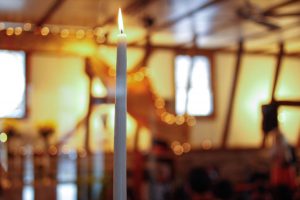The Universal Worship
 Overview
Overview
Increasingly, people are finding they need ceremonies that go deeper, ceremonies that resonate with the basic spirituality that underlies all religion, and so can be shared and understood by people of any religion, or even no religion at all. Spiritual ceremony in the Universal Worship is done by those who have been given special training and experience, and who are called Cherags, from the Persian word meaning lamp or light. Cherags perform the Universal Worship, a ceremony offering our reverence and gratitude for the message of God as it has been given to humanity through all the religions. We honor the One Being in many different forms, the one light in all prophets, saints and masters of all religions and spiritual traditions, the one message in many scriptures.
Every traditional religion also has ceremonies for the major events in life since these events often have meaning beyond what words can explain. Births, deaths, marriages, changes of our residences, changes in our understanding — for these events and others we need symbols and ceremonies to express and share their deeper significance. Ordained Cherags can perform weddings, baby blessings, house blessings, and funeral services.
The Universal Worship does not compete with any of the existing religions and is not a new religion; it offers teachings and guidance that enhance a fuller realization of any of the religions and of the essential unity of being that can be attained through any spiritual path.
What is most necessary today is the wakening of the religion of the heart. It does not matter what religion they (people) profess if they know the depth of the religion which is love. And then, all the different forms, the forms of religious service and the forms of prayer, behind them what secret is there? The secret is to prepare the heart for that bliss which only love can give…. For the religion of love is the religion of tolerance, the religion of love is the religion of forgiveness. — Hazrat Inayat Khan
Core Principles
Whether we call on God, Jehovah, Allah, Ram or the Divine Mother, these are all expressions of the feeling that we are somehow part of a greater whole. The Universal Worship recognizes that intuition as an underlying commonality of all people and of every faith.
There is one underlying truth in the depth of all the different sacred scriptures that have been revealed at different times and in different cultures.
Similarly, spiritual guidance towards an ideal has come through the ages in every culture, through many prophets, masters and saints. These beings form part of our global heritage and we honor them individually as an embodiment of one Divine Spirit of Guidance.
Respect for the sacredness of another’s high ideal or vision of religion is a further principle. The Universal Worship acts as a catalyst to bring together those of different faiths or of no faith in an awakening of the human spirit to our essential Oneness.
Transformational Stages & Application to Individual and Community Life
The Universal Worship represents a new paradigm in spirituality: transformation through ecstasy. In the Universal Worship, ecstasy is sparked by glorification, by prayer infused with love. In prayer, one acknowledges and turns to a reality that is greater than the one who one thinks one is. Thereby one opens to discover aspects of one’s being that one did not know. This process is enhanced by studying the life and message of the great beings, prophets, saints, masters, and teachers of humanity. Discovering new aspects of one’s self changes one’s perspective in life and the relationship with others.
The Universal Worship is a path of love. Expansion in love occurs through stages. Cultivating one’s personal way to spiritual growth and learning new practices help one develop the capacity of the heart. Studying one’s own tradition from a perspective that roots one’s belief in deep faith allows one to recognize the same light in other paths and scriptures. When the love of one’s own prophet or ideal grows and embraces all prophets, messengers, and high ideals, the diversity of forms and expressions of these ideals becomes a constant source of affirmation of one’s basic trust. The source of faith and meaningfulness is replenished by using it to inspire acts of solidarity and service to one’s community. On a global level, it fosters impulses and initiatives that unite the human family in mutual respect and appreciation of the many forms of beauty and divinity. Promoting understanding and collaboration between religions, the Universal Worship becomes an instrument of peace.